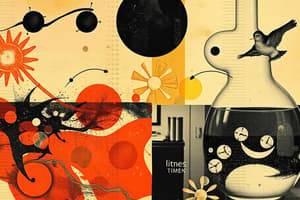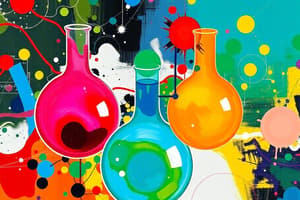Podcast
Questions and Answers
In which phase of water are the molecules close together but able to move around to some extent?
In which phase of water are the molecules close together but able to move around to some extent?
- Plasma
- Liquid (correct)
- Solid
- Gas
Which phase conversion is usually involved in distillation?
Which phase conversion is usually involved in distillation?
- Gas to solid
- Liquid to gas (correct)
- Solid to liquid
- Solid to gas
Filtration usually involves separating which phases from a mixture?
Filtration usually involves separating which phases from a mixture?
- Gas from solid
- Liquid from gas
- Solid from liquid (correct)
- Liquid from liquid
Which of the following is a heterogeneous mixture?
Which of the following is a heterogeneous mixture?
The smallest unit of a chemical compound is a(n):
The smallest unit of a chemical compound is a(n):
Which state of matter has a definite volume but not a definite shape?
Which state of matter has a definite volume but not a definite shape?
What is a defining characteristic of a solid state of matter?
What is a defining characteristic of a solid state of matter?
Which process is considered a chemical change?
Which process is considered a chemical change?
Which of the following processes is classified as a physical change?
Which of the following processes is classified as a physical change?
In a chemical change, which statement is true?
In a chemical change, which statement is true?
Which of the following is an example of a chemical change?
Which of the following is an example of a chemical change?
At which temperature would iodine be in a gaseous state if it melts at 114°C and boils at 184°C?
At which temperature would iodine be in a gaseous state if it melts at 114°C and boils at 184°C?
Which process does not involve a chemical change?
Which process does not involve a chemical change?
Which of the following describes a chemical property of gold?
Which of the following describes a chemical property of gold?
Which of the following is an example of a chemical change?
Which of the following is an example of a chemical change?
How many of the following are pure compounds: sodium, sugar, oxygen, air, iron?
How many of the following are pure compounds: sodium, sugar, oxygen, air, iron?
Which of the following is an element?
Which of the following is an element?
Which of the following is an example of a homogeneous mixture?
Which of the following is an example of a homogeneous mixture?
What distinguishes a solution from a compound?
What distinguishes a solution from a compound?
Which of the following processes requires chemical methods?
Which of the following processes requires chemical methods?
Which of the following is a chemical change?
Which of the following is a chemical change?
Which of the following statements is true?
Which of the following statements is true?
Which of the following is not a physical change?
Which of the following is not a physical change?
Which of the following substances is a compound?
Which of the following substances is a compound?
True or false: An element consists of only single atoms of that element.
True or false: An element consists of only single atoms of that element.
How many of the following are pure substances: water, air, carbon, brass, gold?
How many of the following are pure substances: water, air, carbon, brass, gold?
Which of the following describes a characteristic of gases?
Which of the following describes a characteristic of gases?
Flashcards are hidden until you start studying
Study Notes
States of Matter
- Gaseous state: no definite shape or volume.
- Liquid state: definite volume but no definite shape.
- Solid state: both definite volume and shape.
- Matter: anything that possesses mass and volume.
Changes in Matter
- Physical changes: alterations that do not affect the chemical composition.
- Examples: boiling water, ironing a shirt, evaporating alcohol.
- Sugar dissolving in coffee is a physical change.
- Chemical changes: transformations that result in new chemical substances.
- Examples: cooking an egg, burning gasoline, fermentation of fruit juice.
- Metal rusting is a chemical change.
Properties of Substances
- Chemical properties: characteristics that involve chemical reactions.
- Gold is considered nonreactive (inert).
- A chemical change can result in substances with different properties.
- Physical properties: characteristics identifiable without changing the substance.
- Water’s boiling point (100°C) is a physical property.
Classifications of Matter
- Pure substances: materials with uniform composition, such as elements and compounds.
- Elements: pure substances that cannot be broken down; examples include aluminum and oxygen.
- Compounds: substances formed from chemical combinations of elements; examples include water (H2O) and ammonia (NH3).
- Mixtures: combinations of two or more substances that maintain their individual properties; can be homogeneous (uniform composition) or heterogeneous (distinct components).
Processes and Characteristics
- Filtration: method for separating solids from liquids.
- Distillation: process typically involving the conversion of a liquid to gas and back, used to separate components based on differences in boiling points.
- Molecules in different states of water:
- Solid: molecules close and rigid.
- Liquid: molecules close yet mobile.
- Gas: molecules far apart and move freely.
True/False Statements
- An element can consist only of single atoms: False (can form diatomic molecules).
- A solid substance is matter: False (solid substances are indeed matter).
- Juice freezing is a physical change: True.
- Boiling water involves a chemical change: False (it’s a physical change).
Additional Notes
- Compounds have a constant composition, while mixtures can vary.
- Homogeneous mixtures are also known as solutions.
- Only burning a substance constitutes a chemical change, while melting or boiling involves physical changes.
Studying That Suits You
Use AI to generate personalized quizzes and flashcards to suit your learning preferences.




